A psychologist compared my autism to a fatal condition
When I decided to pursue an autism diagnosis, I was hoping for clarity, self-understanding, and maybe even a bit of support. What I wasn’t expecting was to have my neurodivergence compared to a fatal, degenerative disease.
The psychologist I spoke with didn’t offer validation or encouragement. Instead, he presented a hypothetical scenario involving Huntington’s disease, a terminal neurological condition. “Would you even want to know?” he asked, as if discovering I was autistic would be akin to receiving a death sentence.
My stomach sank. I wasn’t calling for a philosophical debate—I was trying to book an appointment for my autism diagnosis.
The Harm of Medical Ableism
Experiences like mine are, unfortunately, not uncommon. Many autistics face skepticism, dismissal, and outright ableism from medical professionals when seeking an autism diagnosis, especially later in life. This can take the form of:
- Gatekeeping autism diagnoses by making the process unnecessarily difficult or discouraging individuals from seeking answers.
- Invalidating autistic experiences by questioning the legitimacy of self-identification or framing autism as an inherently negative condition.
- Perpetuating harmful stereotypes that paint autism as a tragedy rather than a natural variation of neurodivergence.
The psychologist’s comparison to Huntington’s disease wasn’t just offensive—it was wildly inaccurate. Autism is not a degenerative illness. It is not a death sentence. It is a different way of experiencing and interacting with the world. Yet, the way some medical professionals handle autism diagnoses can make it feel like a burden rather than an empowering revelation.
Why an Autism Diagnosis Matters
For many, receiving an autism diagnosis is not about seeking a label—it’s about gaining access to understanding, accommodations, and community. Knowing I was autistic allowed me to:
- Identify my sensory sensitivities and social communication differences as valid, rather than as personal failings.
- Advocate for my own needs in work and social settings.
- Connect with other autistics who shared similar experiences.
Not knowing, on the other hand, often leads to years of struggling with unidentified challenges, self-doubt, and unnecessary hardship. An autism diagnosis can be a transformative moment, allowing individuals to understand their experiences in a new light.
The Importance of Perseverance
After my frustrating encounter, I didn’t give up. I kept calling around until I found a professional who was willing to listen. Eventually, I got my autism diagnosis—and it was life-changing. It validated what I had known deep down but had struggled to articulate.
If you are seeking an autism diagnosis and face similar roadblocks, don’t let one dismissive professional deter you. Your experiences are real, and your struggles deserve recognition. Keep pushing forward. The right support exists—you just have to find it.

The Need for Change
That said, medical professionals must do better. They need to:
- Approach autism diagnoses with compassion and respect.
- Recognize that autistics are the best experts on their own experiences.
- Dispel outdated, harmful misconceptions about autism.
Autistics shouldn’t have to fight for their autism diagnoses, nor should they be made to feel like their existence is a tragedy. Neurodivergence is a part of human diversity, and it’s time the medical field treated it as such.
Final Thoughts
An autism diagnosis is not a label—it is a tool for empowerment. It helps autistic people navigate the world with greater understanding and access to the support they need. By fostering a more inclusive and neuroaffirming approach, medical professionals can ensure that autistics are met with dignity, respect, and the care they deserve.
If you have been met with resistance or ignorance in your pursuit of an autism diagnosis, know that your experience is valid. Your struggles are real, and you are not alone. Keep advocating for yourself, seek out supportive professionals, and remember—your neurodivergence is not a flaw. It is a part of who you are, and you deserve to be seen and heard.
Have you faced challenges in getting an autism diagnosis? Share your story in the comments.

Essy Knopf is a therapist who likes to explore what it means to be neurodivergent and queer. Subscribe to get all new posts sent directly to your inbox.
© 2025 Ehsan "Essy" Knopf. Any views or opinions represented in this blog are personal and belong solely to the blog owner and do not represent those of people, institutions or organizations that the owner may or may not be associated with in professional or personal capacity, unless explicitly stated. All content found on the EssyKnopf.com website and affiliated social media accounts were created for informational purposes only and should not be treated as a substitute for the advice of qualified medical or mental health professionals. Always follow the advice of your designated provider.


